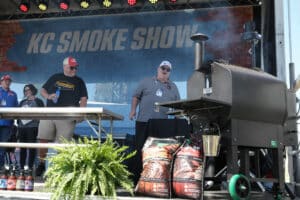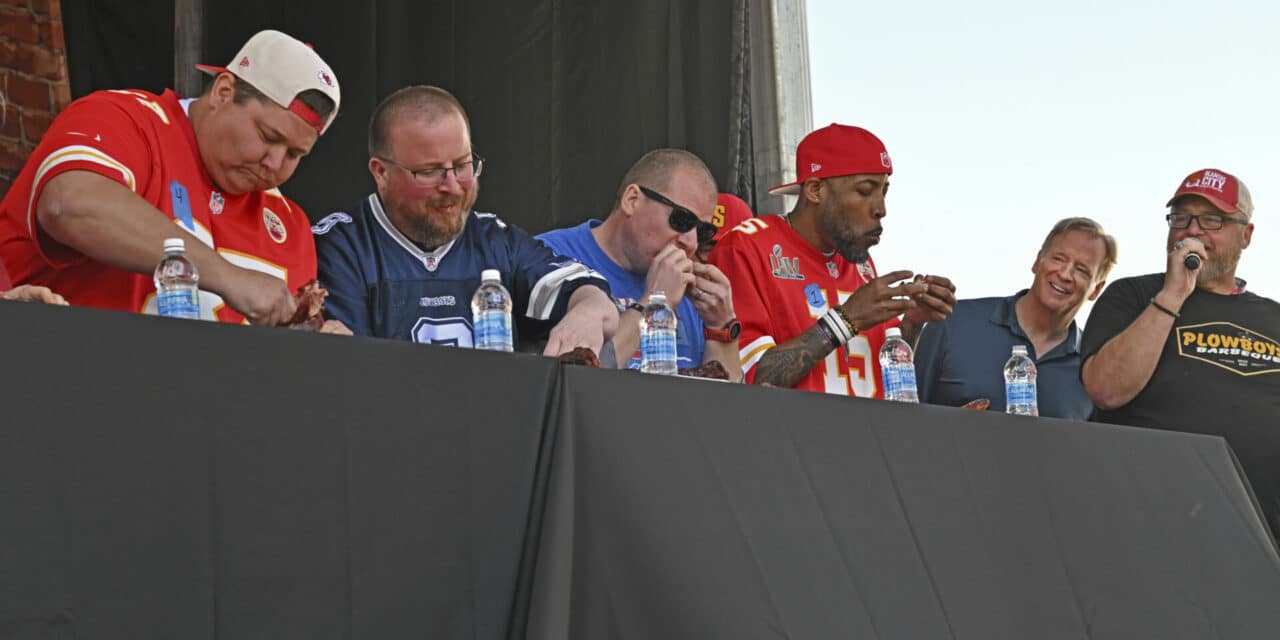RIB TICKLER: NFL Commissioner Roger Goodell, second from right, checks out the rib- eating competition at the 2023 NFL Draft in Kansas City. Ryan McCluskey, far left, won the contest. (AP Photo)
Local restaurants help generate $1.1 million in sales
The NFL Draft has evolved into a massive food-centric festival as league officials dig deep into the hospitality and culture tied to the host market for programming the three-day celebration of the shield and its brand.
The 2023 draft took place April 27-29 at historic Union Station in downtown Kansas City, Missouri, a market well known for its tasty barbecue, coupled with a strong tailgating tradition at Arrowhead Stadium, home of the Kansas City Chiefs, the defending Super Bowl champs.
As a result, launching the rib-eating competition as part of the NFL Draft was a no-brainer. There were educational moments for attendees learning the finer points of the craft though the KC Smoke Show. It was held on Saturday, the final day of the draft, spotlighting skills among some of the country’s premier pitmasters.
Overall, the draft drew 312,000 attendees, the NFL reported, which is about half the estimated attendance of 600,000 for the 2019 NFL Draft held in downtown Nashville, a league record since the event went on the road starting in Chicago in 2015. Still, it’s an impressive number for Kansas City, one of the NFL’s smaller markets, and folks arrived with a hearty appetite over the course of the three days.
The 20 food vendors, a collection of local restaurants extending to dishes apart from BBQ, generated $1.1 million in gross food sales. NFL officials did not disclose specific sales totals from past NFL Drafts, but said concessions were up over previous drafts. For this year, participating restaurants were handpicked by league officials in tandem with festival producers C3 Presents and Eximius Productions.
All vendors were vetted in terms of their ability to meet demand and serving a large volume of food in a festival setting, said Nicki Ewell, the NFL’s senior director of events.
Unlike the Super Bowl, where the host stadium’s concessionaire runs the food operation, the NFL fills that role for the draft and hires C3 Presents to help operate the event, book live entertainment and line up food vendors. On her own, Ewell handpicked Baba’s Pantry, owned and operated by a Palestinian American family, after reading about them in Bon Appetit magazine.
Kansas City restaurateurs paid a $2,500 fee to cover their tent, signage, menu board, power and Square point-of-sale system in a cashless environment, plus a health department fee of roughly $200, which is standard, according to the vendors.In return, they kept 100% of revenue from selling their products, Ewell said.
Admission is free to the NFL Draft. Fans pay out of pocket for concessions and merchandise. Ewell said the NFL makes an effort to keep concession prices affordable, recognizing it’s a family event and that some attendees may not otherwise be able to attend an NFL game. Sodas cost $5, bottled water $4, beer $13-$14, wine $12-$15 and cocktails $16, as reported by local media.
The Hereford House, a 66-year-old Kansas City steakhouse and among the local participants, sold hot dogs for $8 and burgers for $10-$15.
Many would argue food and alcohol prices were aligned with stadium pricing over the street pricing model Ewell alluded to for the NFL Draft. She did say higher-priced items were bigger portions that could be shared among multiple people.
As it moves around the country, the draft delves into the roots of the local community, which was the case in Kansas City. How deep the NFL dives into the food culture depends on the market, according to Ewell. Last year in Las Vegas, NFL Draft partner Caesars Entertainment developed the food service platform, featuring their brands, so it wasn’t necessarily local flavors, she said.

Brian Wahby
“This year, more than any other year, we leaned into the food experience in differentiating this draft,” Ewell said. “We wanted be as authentic as possible, so we did a lot of work to make sure that we weren’t coming in from New York and LA to say, ‘OK, we know what good barbecue is.’”
To make those decisions, the NFL and C3 Presents turned to Eximius Productions, owned by Brian Wahby.
Wahby’s firm, headquartered in St. Louis, Missouri, runs BBQ festivals at three NFL stadiums: Arrowhead, AT&T Stadium in Arlington, Texas and Empower Field in Denver, Colorado, plus Kiener Plaza, a non-NFL venue in St. Louis. Wahby took charge of the BBQ equation due to his strong relationships with national pitmasters he books for those weekend events over the summer months that typically attract 10,000 to 12,000 patrons.
For Wahby, it was his first NFL Draft. The Chiefs recommended him to the league after working with Wahby at their event for the past three years. For the draft, Eximius Productions’ deal was with C3 Presents, and together, they sourced local restaurant talent with a focus on BBQ.
Wahby also produced the smoke show. It marked the first time the NFL marketed the draft in a “food forward role,” he said. “Part of it was because we were in Kansas City, one of the capitals of barbecue. It was the perfect storm. The Chiefs won the Super Bowl. It’s a Midwestern city, which likes this kind of party, and they embraced it.”

SMOKE-OUT: The KC Smoke Show went over the finer points of pit barbecue at the NFL Draft. (Getty Images)
The smoke show encompassed cooking demonstrations and a BBQ competition among nine chefs judged by Kansas City Mayor Quinton Lucas and former NFL players. Local favorites such as Arthur Bryant’s, KC Joe’s and Gates were part of that activity.
The rib-eating contest, which Wahby brands as a “rib rumble,” was a highlight. Ten contestants consumed as many ribs as they could in five minutes. NFL Commissioner Roger Goodell was on stage lending encouragement to the individual eaters, Wahby said.
Ryan McCluskey of Kansas City, a high school teacher wearing Chiefs colors, won the rumble.
Granfalloon, a 46-year-old Kansas City sports bar on Country Club Plaza, an outdoor retail and entertainment district, was among the restaurants participating in the NFL Draft and owner Tim Caniglia said the event was good for his business. They sold burgers for $14, burnt end nachos for $15, bratwursts for $9 and six wings for $10.
At first, Caniglia was against the opportunity because restaurants weren’t allowed to sell alcohol, which is where vendors doing festivals make most of their money, he said. Best Beverage, the company that works the official NFL Tailgate Party at the Super Bowl, held the contract to sell alcohol at the draft, including the Bud Light Beer Tent.
Caniglia changed his mind after talking to his business partner and marketing director. Granfalloon applied for the draft and was selected. It was well organized, he said. The on-site setup made it workable for restaurants by providing refrigerated semi trucks next to their stands, which made it more convenient to restock food items.
“We had a line the entire time, and if we got low on burgers, we could grab some from the cooler and start cooking them on our grill,” Caniglia said. “They had two trucks and each restaurant had space to put their supplies. The NFL did a great job. It was easily set up and torn down.”
Frank Cherrito of Scimeca’s Italian Sausage, a retail market dating to 1935, echoed those comments. “The crowds were huge each day, especially on Thursday. We did a ton of business and got to show what we do best on a national stage,” Cherrito said.
Next year, the NFL Draft moves to Detroit and Ewell starts planning for it this month. The vendor mix will include multiple Black-owned restaurants, she said.
“The food culture is just as rich as it is in Kansas City,” Ewell said. “It’s Americana in a way that’s tailgate fare, but it just doesn’t have to be wings and barbecue and burgers. We’ll make sure to bring that soul to our event. We’ve talked how to involve more (NFL) clubs and have a little bit more of a face-off, because that’s the point of the draft, to celebrate all 32 teams but also bring that healthy competition and rivalry, which we love.”
Editor’s Note: This story has been updated.







